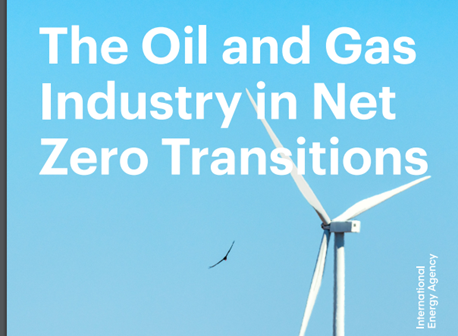
Energy analyst for the IEA World Energy Outlook, former Chancellor's Fellow at Edinburgh University, views are my own
2 subscribers
How to get URL link on X (Twitter) App




 Exhibit A is that clean energy technology costs have come down massively over the past several years (even if there was a period of post-pandemic cost inflation).
Exhibit A is that clean energy technology costs have come down massively over the past several years (even if there was a period of post-pandemic cost inflation). 

 If you’re an oil and gas company, how do you play a part in transitions, especially now that a peak in fossil fuels is visible before 2030? How do you plan for a scenario reaching net zero where, for every dollar invested in fossil fuels, 10 dollars gets invested in clean energy?
If you’re an oil and gas company, how do you play a part in transitions, especially now that a peak in fossil fuels is visible before 2030? How do you plan for a scenario reaching net zero where, for every dollar invested in fossil fuels, 10 dollars gets invested in clean energy? 

 If you want to dismiss the idea of a peak in fossil fuels, you’d point to the strong historical relationship between GDP and fossil fuels. But this relationship is already changing and, in all our scenarios, it is transformed by the emergence of a clean energy economy.
If you want to dismiss the idea of a peak in fossil fuels, you’d point to the strong historical relationship between GDP and fossil fuels. But this relationship is already changing and, in all our scenarios, it is transformed by the emergence of a clean energy economy.

 Today, the @IEA released a report about these ‘scope 1+2’ emissions, drawing together a body of work many years in the making. The headline message: these emissions can and should drop by more than half by 2030, and it’s one of the cheapest ways of cleaning up the energy system.
Today, the @IEA released a report about these ‘scope 1+2’ emissions, drawing together a body of work many years in the making. The headline message: these emissions can and should drop by more than half by 2030, and it’s one of the cheapest ways of cleaning up the energy system.

 There was quite a lot of variation between sectors and countries. Germany cut the most gas in absolute terms, but in percentage terms it was the Baltic and Nordic countries.
There was quite a lot of variation between sectors and countries. Germany cut the most gas in absolute terms, but in percentage terms it was the Baltic and Nordic countries. 

 Reaching a plateau is indeed big news. Natural gas grew by 20% from 2011 to 2020. The WEO projection is for 5% growth from 2021 to 2030, and then pretty much flat after that.
Reaching a plateau is indeed big news. Natural gas grew by 20% from 2011 to 2020. The WEO projection is for 5% growth from 2021 to 2030, and then pretty much flat after that. 

 The total investment needed in clean energy to displace coal? $380 billion per year, globally, from now until 2030. That is around 20% of all clean energy spending in our Announced Pledges Scenario, which gets the world to 1.7°C by 2100.
The total investment needed in clean energy to displace coal? $380 billion per year, globally, from now until 2030. That is around 20% of all clean energy spending in our Announced Pledges Scenario, which gets the world to 1.7°C by 2100. 

 What happens next with Russian gas is obviously uncertain, but as @tim_gould_ said at the WEO launch yesterday, we assume that there’s no way back for the EU-Russia gas relationship. That relationship was built up over many decades on the basis of trust. And that trust has gone.
What happens next with Russian gas is obviously uncertain, but as @tim_gould_ said at the WEO launch yesterday, we assume that there’s no way back for the EU-Russia gas relationship. That relationship was built up over many decades on the basis of trust. And that trust has gone.


